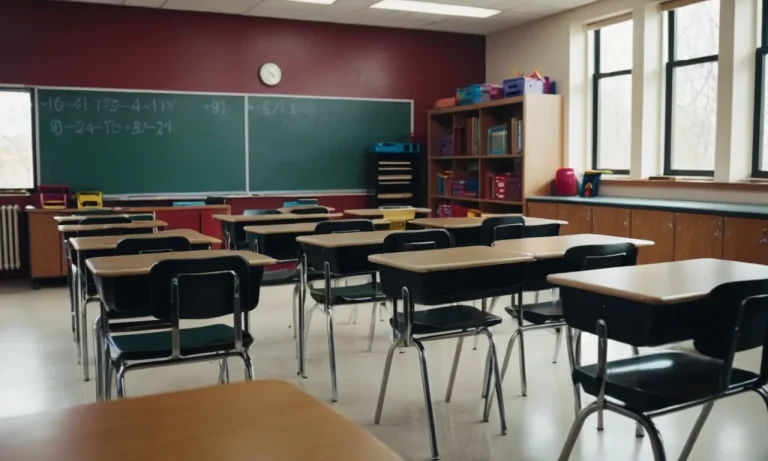In today’s rapidly evolving world, understanding the principles of economics has become increasingly crucial for navigating the complexities of personal finance, business decisions, and global economic trends.
If you’re short on time, here’s a quick answer to your question: Economics is not a universally required class in high school across the United States, but it is often offered as an elective or incorporated into other subjects like social studies or business education.
In this comprehensive article, we’ll delve into the importance of economics education, explore the current state of economics curricula in high schools, and examine the potential benefits and drawbacks of making it a mandatory subject.
We’ll also discuss alternative approaches to introducing economic concepts and the role of personal finance education in preparing students for real-world financial challenges.
The Importance of Economics Education
In today’s fast-paced and interconnected world, understanding economics has become an essential skill for navigating both personal and professional spheres. As such, the inclusion of economics as a required class in high school can provide students with a solid foundation for success in various aspects of life.
Here are some compelling reasons why economics education is crucial:
Understanding Personal Finance
One of the most practical benefits of studying economics is the ability to better manage personal finances. From budgeting and saving to investing and understanding credit, economics equips students with the knowledge and tools to make informed financial decisions.
According to a survey by the Council for Economic Education, students who took a personal finance course were more likely to exhibit positive financial behaviors, such as saving and budgeting (https://www.councilforeconed.org/news-information/survey-of-the-states/).
😊 Wouldn’t it be great if every high school student could confidently navigate the complexities of personal finance?
Developing Critical Thinking Skills
Economics is not just about numbers and formulas; it’s a discipline that fosters critical thinking and analytical skills. Students learn to analyze data, identify patterns, and draw logical conclusions.
They also develop the ability to evaluate different economic theories and policies, weighing their pros and cons. These skills are invaluable in any career path and can help students become more effective problem-solvers and decision-makers.
Can you imagine how much more efficient and productive our society would be if everyone had these critical thinking abilities? 🤔
Preparing for Career Readiness
In today’s competitive job market, having a solid understanding of economics can give students a significant advantage. Whether they pursue careers in business, finance, government, or any other field, a grasp of economic principles will provide them with a valuable foundation for success.
According to the National Association of Colleges and Employers, economics majors consistently rank among the top-paid graduates (https://www.naceweb.org/job-market/compensation/). Wouldn’t it be awesome if high school students had a head start in this lucrative field? 👏
Fostering Global Awareness
Economics is a global discipline that transcends borders and cultures. By studying economics, students gain insights into the interconnected nature of the world economy and the impact of economic policies on different nations and societies.
This understanding can foster a greater appreciation for global diversity and promote empathy and cross-cultural understanding. In an increasingly globalized world, these skills are invaluable for navigating international relationships and collaborations.
Can you imagine how much more harmonious and productive our world would be if everyone had this global perspective? 🌍
Current State of Economics in High School Curricula
The inclusion of economics in high school curricula varies greatly across states and districts in the United States. While some regions place a strong emphasis on teaching economic principles, others offer limited or no dedicated courses in the subject.
This disparity has sparked an ongoing debate about whether economics should be a required class for all high school students.
Variations Across States and Districts
According to a survey by the Council for Economic Education, only 22 states require students to take an economics course to graduate from high school. The remaining states either make it an elective or do not mandate any economics education at all.
Even within states that require economics, the depth and breadth of coverage can vary significantly between districts and individual schools.
Elective vs. Required Courses
In states where economics is an elective, students often have the option to take courses like Personal Finance, Microeconomics, Macroeconomics, or a general Economics course. However, the elective nature of these courses means that many students may graduate without a fundamental understanding of economic concepts.
Advocates argue that making economics a required course would ensure all students gain essential knowledge about personal finance, market forces, and economic systems.
| State | Economics Course Requirement |
|---|---|
| California | Elective |
| Texas | Required |
| New York | Elective |
| Florida | Required |
Integration with Other Subjects
In some cases, economic concepts are integrated into other required courses, such as social studies, government, or business classes. While this approach can provide students with exposure to economic principles, critics argue that it may not offer the same depth of understanding as a dedicated economics course.
Proponents, on the other hand, suggest that integrating economics into existing curricula can make the subject more relevant and accessible to students.
As the debate continues, educators, policymakers, and advocates alike are working to find the best approach to ensure that high school students graduate with a strong foundation in economics. After all, an understanding of economic principles is crucial for making informed decisions as consumers, investors, and citizens in today’s complex global economy.
😊
Pros and Cons of Mandatory Economics Classes
Benefits of Requiring Economics
Introducing economics as a mandatory subject in high school curricula can yield substantial benefits for students. Economics provides a lens through which young minds can analyze and comprehend the complexities of the world around them.
By understanding economic principles and theories, students develop critical thinking skills that transcend academic boundaries and prepare them for real-life decision-making. According to a survey by the Council for Economic Education, students who take an economics course demonstrate a better grasp of financial literacy and personal finance management.
Furthermore, economics equips students with essential knowledge for navigating the global economy. As future consumers, employees, and entrepreneurs, they will encounter economic forces that shape markets, influence policy decisions, and impact their daily lives.
EconEdLink, a leading resource for economic education, highlights the importance of economics in fostering an understanding of current events, public policy debates, and international trade dynamics. 😊
Potential Drawbacks and Challenges
While the advantages of mandatory economics education are compelling, there are also potential drawbacks and challenges to consider. One concern is the potential strain on already-crowded high school curricula.
Introducing a new required course may necessitate reducing instructional time for other subjects, creating a delicate balance between academic priorities. Additionally, there may be resource constraints, such as a shortage of qualified economics teachers or limited funding for educational materials.
Another challenge lies in the complexity of economics itself. Some students may find the abstract concepts and quantitative analysis daunting, leading to disengagement or frustration. Effective teaching strategies and engaging pedagogical approaches are crucial to make economics accessible and relatable to diverse learners.
According to a study by the National Center for Education Statistics, only 21% of high school students reported taking an economics course in 2018. This highlights the need for increased awareness and advocacy for economics education.
Balancing Academic Priorities
Striking the right balance between mandatory economics classes and other academic priorities is a delicate task. While economics undoubtedly offers valuable insights and skills, it should not come at the expense of neglecting core subjects like mathematics, science, and language arts.
A holistic approach that integrates economics concepts into existing curricula or offers it as an elective could be a viable compromise.
Ultimately, the decision to make economics a required class in high school should be guided by careful consideration of educational objectives, resource allocation, and the unique needs of each school district or state.
Engaging stakeholders, including educators, policymakers, and industry professionals, can help inform a well-rounded perspective on the matter. By fostering economic literacy among students, we can empower them to make informed decisions and contribute to a thriving society. 👏
Alternative Approaches to Economics Education
Extracurricular Activities and Clubs
While economics may not be a mandatory course in all high schools, students can still gain valuable insights into the subject through extracurricular activities and clubs. For example, many schools offer Future Business Leaders of America (FBLA) or DECA clubs, which provide opportunities to learn about entrepreneurship, business operations, and economic principles.
These clubs often organize competitions, workshops, and guest speaker events, allowing students to apply their knowledge in practical scenarios.
Additionally, some schools have dedicated economics clubs or investment clubs, where students can discuss current economic trends, analyze market data, and even participate in simulated stock trading exercises.
These clubs not only foster an understanding of economics but also develop critical thinking, decision-making, and analytical skills that are invaluable in various careers. Participating in such clubs can be a great way to explore economics outside the traditional classroom setting and gain hands-on experience.
😎
Online Resources and Self-Study
In today’s digital age, there are numerous online resources available for students interested in learning about economics. Platforms like Khan Academy and Coursera offer free online courses, video lectures, and interactive exercises covering various economic concepts.
These resources can be incredibly helpful for students who want to supplement their classroom learning or pursue self-study.
Additionally, many reputable organizations and universities provide free educational materials, such as EconEdLink from the Council for Economic Education and FederalReserveEducation.org from the Federal Reserve.
These websites offer lesson plans, interactive simulations, and engaging activities that make learning economics more accessible and enjoyable. With the wealth of online resources available, students can tailor their learning experience to their interests and pace, fostering a deeper understanding of economic principles.
🎓
Integrating Personal Finance Concepts
While traditional economics courses may focus on macroeconomic theories and principles, integrating personal finance concepts can make the subject more relatable and practical for high school students.
According to a survey by the Council for Economic Education, only 21 states currently require personal finance education in high school. However, equipping students with financial literacy skills can not only enhance their understanding of economics but also prepare them for real-life situations.
By incorporating topics such as budgeting, saving, investing, credit management, and consumer decision-making into the curriculum, students can better grasp the practical applications of economic principles.
Engaging activities like simulating household budgeting, analyzing credit card statements, or exploring investment strategies can make the subject more tangible and relevant. Furthermore, developing financial literacy skills at a young age can empower students to make informed decisions and cultivate responsible financial habits early on, setting them up for long-term success.
Don’t you think it’s awesome to learn about personal finance in high school? 💰
Conclusion
The decision to make economics a required class in high school is a complex one, with valid arguments on both sides. While some advocate for its mandatory inclusion to equip students with essential financial literacy and critical thinking skills, others raise concerns about overcrowding curricula and the potential trade-offs with other academic priorities.
Ultimately, the approach to economics education may vary across states, districts, and individual schools, reflecting local priorities and resources. However, it is clear that exposing students to economic concepts, whether through dedicated courses, integration with other subjects, or alternative learning opportunities, can provide invaluable knowledge and skills for navigating the complexities of personal finance, career decisions, and global economic trends.






